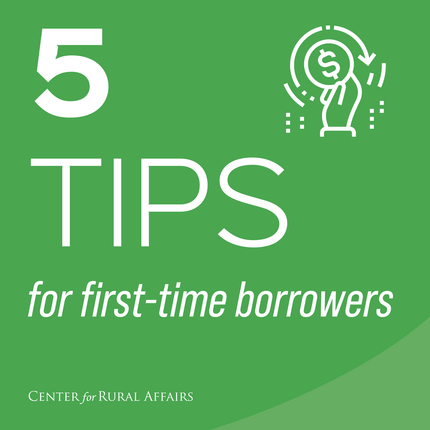Para la versión en español, oprima aquí.
Jessie Eby contributed to this blog.
Big moves often require big investments. When you’re starting or expanding a business, the cost can be daunting. But don’t let that deter you from pursuing your dreams. This guide will help you get through your first-time lending experience.
Planning and budgeting
Before taking out a loan, budgeting and planning should be at the top of your list. Have an idea of how much you’ll need to cover the costs of the business and an understanding of your monthly budget so you can figure out what you can safely afford to borrow. You’ll need to have a solid grasp of your monthly income and your expenses. Ask yourself if there is room in your budget for a monthly loan payment. If so, how much? Determining this will help you avoid dangerous borrowing situations that could leave you in a difficult financial position.
Your business plan is an important tool throughout the lending process, but especially in the planning and budgeting stage. You’ll want to have a general idea regarding your business’s projected income and cash flow so you and your lender can work together to secure the funding you need. Need help with a business plan for your loan application? We’re here for you! Click here to find your loan specialist.
It’s important to note that getting a loan will require an investment on your part. Whether you are looking to finance all or some of it, you will need to come up with some of the money upfront as a down payment. If you don’t already have money saved for a down payment, you’ll need to explore your options for saving or otherwise securing the amount.
Depending on the lender, you may or may not need a down payment. Having a down payment will reduce your new debt and will reduce your monthly payment or obligation. Borrowers should ask the lender if a down payment will be required and how much will be expected.
Finding a lender
Visit with several prospective lenders to see who will best serve your needs. Some lenders are more willing to work with startups, and others may be more interested in a business with a track record. Explore your options and make sure you find a lender that meets your needs.
The Center for Rural Affairs works with rural Nebraskans to secure the money they need to pursue their dreams of small business ownership. Our underwriting process is more flexible than traditional lenders, so we’re able to serve you whether you’re just starting or have little credit history. Our goal is to provide the education and financial stepping stones necessary to land in a healthy banking relationship. And while banks tend to be less geared toward serving startups, they can offer a wider range of products.
Know your credit score
Your credit score will play a key role in securing funds. You should know your credit score and history. You can access a free credit report at annualcreditreport.com. Being aware of these numbers will give you a chance to see what your lender will see and allow you to talk clearly about your past, as well as identify any errors from those reporting on your behalf. You also may be able to clear up any issues you were unaware of, which will help streamline the lending process.
Building credit
A common roadblock for new borrowers is having little or no credit history. If you find yourself in this position, it’s a good idea to start with a lender who can help you start building credit. This is often in the form of a credit builder loan, which differs from a typical loan in that rather than getting the money upfront, your lender will deposit the amount of the loan into a savings or CD account you cannot use until your loan is repaid.
If you’re able to get an unsecured credit card, it’s important to use it at least once a month for items you would normally buy and make sure to pay your balance off monthly. If you can’t get an unsecured credit card, look into a secured card through your bank. It will take at least six months of timely, regular payments to establish a credit score from a previously underscored history.
Applying for a loan
When applying for a loan, be prepared to provide as many as three bank statements for each account, as many as three tax returns (personal and business), and documentation of any fixed expenses (think lease agreements and professional fees). You’ll also want your most recent pay stubs, invoices for customers, and anything else that can prove your income is stable. Your lender will be looking for consistent, reliable income, so these items will serve you well when your lender is considering your capacity to repay.
We’ve put together a loan application checklist that you can access here.
Collateral
Most lenders will require some sort of collateral. Collateral is something you provide as a guarantee you will repay the loan. Typically, your collateral will be equal to or greater than the value of the loan, and it must consist of an item or items you own. Common items put up for collateral include vehicles, equipment, and buildings. Keep in mind that if you don’t repay your loan, your lender will seize whatever you’ve put up as collateral.
Know the terms of the agreement
Different types of loans have different terms. Equipment loans are shorter term, while real estate loans are longer. It’s important to know how long you’ll be paying back the loan, what your interest rates are, and how often you’ll make a payment.
Watch out for penalties. Not only can you be penalized for late or missing payments, some loans have pre-payment penalties. Use caution around “too good to be true” deals. Red flags include same-day approval, no credit checks, and sign-here buy-here schemes. The Center for Rural Affairs can help you determine if you are about to fall victim to predatory practices such as high interest rates and disadvantageous repayment terms.
Our top 5 tips for first-time borrowers
Borrow only what you need and can afford to repay.
Borrowing more than you need can result in overspending and/or paying interest on money you don’t need. Be smart about what you borrow, and make sure you have a plan in place to repay.
Read the fine print on all documentation before you sign.
Know all terms and conditions before you sign any loan agreements. You want to make sure repayment terms are in your best interest.
Always ask questions if you don’t understand something.
The lender is there to help you. The more you know, the more confident you can be in your borrowing decisions.
Don’t settle on the first option you receive.
Shop around; you want to find the best deal possible. Try to get at least three other options.
Look for a lender who has your back.
Your lender should support you and want to see you succeed. A good lender will understand your business and personal needs, and help you achieve your goals.





